By Martin Clark
Despite the ongoing impact of the Covid pandemic and the desperately sad situation in the Ukraine, nothing can halt the onset of spring. Here in Cyprus, the almond trees are in breathtaking blossom and the air is full of their honey sweet scent and the droning sound of bees. After such a wet winter (the dams are full – BRAVO!) the land is carpeted with a verdant layer of green stuff…. calendula, wild mustard, Bermuda buttercup, field marigold, mallow, chickweed; all these are edible and are collectively (along with many others) known as ‘horta’ by Cypriots.
Wild food is healthy in many ways; it’s fresh, full of vitamins, you know its source and the act of collecting it invoves exercise, also the local village recipes and unique tastes have ‘sense of place’ and are an example of maintaining the village culture (very necessary in these days where everything else moves so very fast – maybe too fast?).
Foraging for ‘wild food’ gains in popularity and Cypriots have always been good at it. In days gone by, it was pretty essential in a pre-tourism country, where the majority of people were poor subsistence farmers. The green stuff of spring was an eagerly awaited boost of nutrition and vitamins in a land burned biscuit brown by the summer sun.
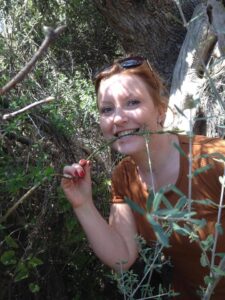
Adriana Dvorska, from Slovakia has worked with me for 15 years now. Wild asparagus can be eaten raw!
My favourite foraged wild food is wild asparagus; Asparagus is very low in calories and is a great source of zinc, calcium and magnesium, as well as vitamins B6, C, E and K. The snake like stems emerging from the old bushes also contain the trace element chromium, which helps us to process glucose and is therefore helpful to diabetics. To find the new stems go under olives and carobs and into hedgerows. Snap them off before they get woody because the lower stem is hard to chew. I break into 5cm pieces, quickly boil in water (I then drink the water like a tea), then cook with scrambled eggs, use fresh, virgin olive oil and lemon plus salt and pepper… wow, a real taste of spring!
For most ‘horta’, the usual way to eat it is to add to beans – either black eyed, giant or ‘fassolia’. I usually cook my beans in the slow cooker on low heat overnight with tomato passata and seasoning and I boil my horta for 10 minutes separately, then add them for a final 15 or so minutes of slow cooking. I only take the freshest stems before flowering and I don’t pick from the roadside (car fumes) or beside footpaths (dogs). I’m only intermittently a vegetarian, so I like to cook beans with smoked ham from Agros! For my horta, I like mallow, calendula, field marigold, wild chard, sow thistle and milk thistle.
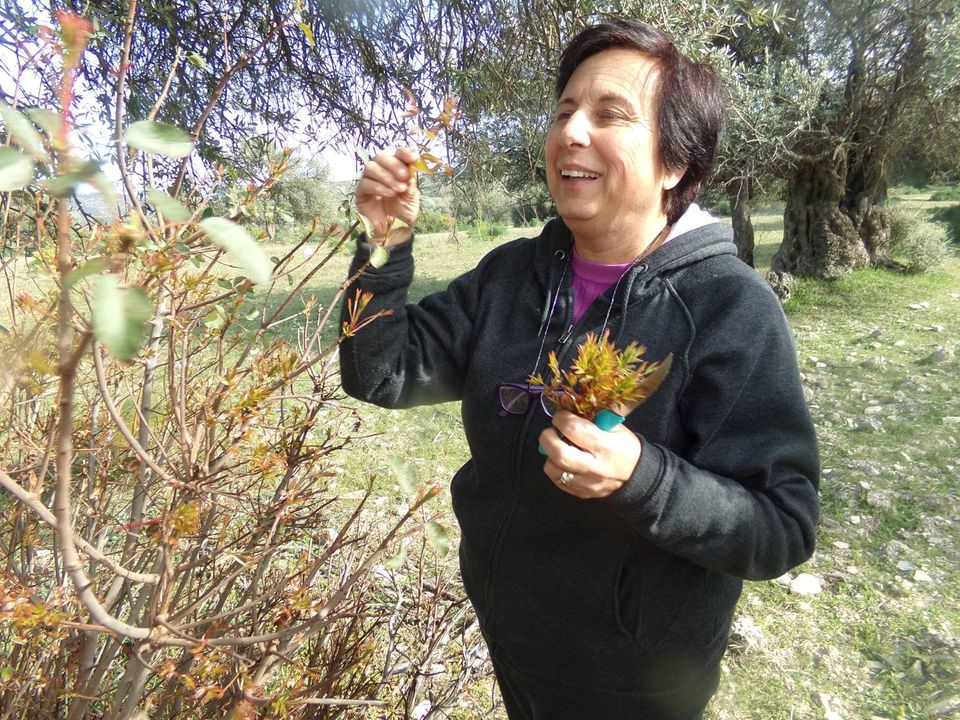
My colleague and friend, Panayiota Demetriou, an ace forager, has taught me such a lot. Here’s Yiota collecting teribinthus leaves for a fresh salad that embraces the Cyprus spring
My friend and colleague, Panayiota Demetriou has introduced me to other spring-time wild food. Salsify or star of Bethlehem (Tragopogon porrifolius) is a plant cultivated for its pretty flower, and herbal properties. It grows wild in Cyprus and is a real signal for spring. Villagers have eaten the lower stem and tender root for centuries. In other countries it is called oyster plant, because the taste is said to resemble this shellfish. The Greek Cypriot name is kolokasia.
Two yellow-flowering wild plants seem to grow everywhere in Cyprus, almost seeming to compete with each other.
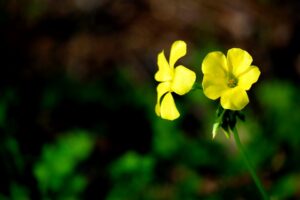
The Bermuda buttercup, which grows everywhere, is good to eat but is a serious weed from South Africa
The Bermuda buttercup (Oxalis pes-caprae) is an intruder and very invasive, it is native to the Cape region of South Africa, where it’s rare and endangered. It’s not at all rare in Cyprus and seems to be spreading everywhere in Europe, becoming a pest and hard to get rid of. Despite this, the plant is good to eat, having a sour, lemony taste. Use the stems, leaves and flowers in soups and with beans, even in salads. The flavour is due to oxalic acid, common in flowering plants in the wood sorrel family Oxalidaceae.
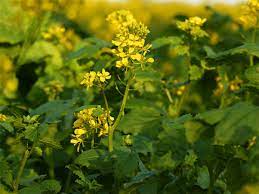
Wild mustard also grows everywhere, but is native and very useful for fighting the effects of climate change
The other yellow flowered plant is wild mustard (Sinapsis arvensis L), also called wild charlock and it’s native to Cyprus. The young fresh leaves (pre-flowering) are good in beans but I like the unopened or recently opened flowers cooked with scrambled eggs; they have a deliciously spicy mustard flavour and are so easy to find. This plant is also useful as a green carpet on ‘white land’, cleared land in limestone areas, which reflects the sun’s rays and causes a double warming of the air, a big climate change problem. I actually think it should be the law that white land should be sown with a fast growing native annual such as wild mustard. When the plant has finished flowering, you can gather the seed (when the pods are brown and crisp) and have a go at grinding your own mustard powder. Finally, the plant is an important host for some of the rarer white butterflies.
As a forester, if I can eat anything from a tree, I’m especially pleased. Cyprus has several wild pistacia varieties, including the terabinth or turpentine tree (Pistacia terebinthus); in the autumn I gather the red turning bronze–green seeds for baking in biscuits but in the spring the young leaves are reddish and great in salads or cooked as a vegetable with an aromatic flavour.
More than before, it is important that we embrace nature’s renewal and give a helping hand. A good start is to start foraging for the simpler and impossible to mistake wild foods, so common in the beautiful island of Cyprus, get some nutritious fresh food, that’s free and start to shed those Covid blues (and those Covid kilos!).
Martin Clark (a professional forester and land manager) is director of Grampus Heritage & Training, the UK’s most successful EU wide vocational training organisation, with 26 years’ experience

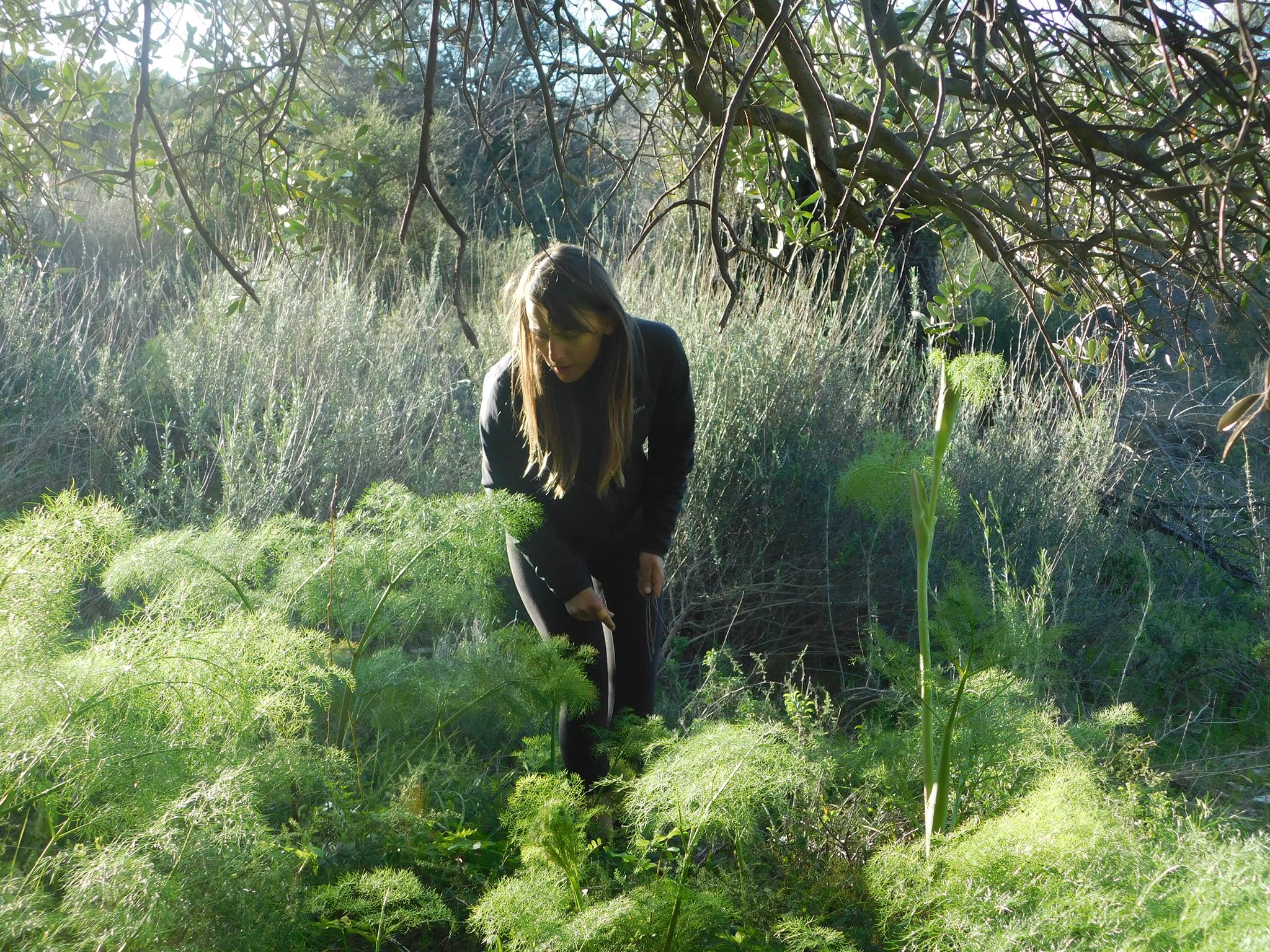





Click here to change your cookie preferences